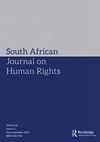Considering the constitutionality of South Africa’s anti-gang legislation in light of the principle of legality
IF 0.6
4区 社会学
Q3 LAW
引用次数: 1
Abstract
Abstract The essence of the principle of legality is to constrain governmental, legislative and judicial power, and protect citizens from the arbitrary exercise of these powers. This is especially true in the context of the drafting and interpretation of criminal law. Criminal laws in particular must be drafted in a reasonably clear fashion to provide citizens with fair warning of criminal sanction. The courts must also interpret these laws strictly, so that citizens are not punished for conduct that did not fall within the scope of either a common law or statutory crime. This article examines whether certain definitions employed in the Prevention of Organised Crime Act 121 of 1998 do not offend the principle of legality as it employs dubiously wide definitions. Although widening the criminal net for, in particular, criminal gang activities, these definitions arguably do not provide fair warning to citizens to avoid criminal sanction and may also be at risk of overbroad judicial interpretation. The analysis will further take place in light of comparable foreign legislation and decisions.从合法性原则考虑南非反帮派立法的合宪性
合法性原则的本质是约束政府权力、立法权和司法权,保护公民不受这些权力的任意行使。在刑法的起草和解释方面尤其如此。特别是刑法必须以合理明确的方式起草,以便向公民提供刑事制裁的公平警告。法院还必须严格解释这些法律,以便公民不会因为既不属于普通法范围也不属于成文法范围的行为而受到惩罚。本文探讨了1998年《防止有组织犯罪法》中使用的某些定义是否违反了合法性原则,因为它使用了令人怀疑的广泛定义。虽然扩大了犯罪网络,特别是犯罪团伙活动,但这些定义可以说没有向公民提供公平的警告,以避免刑事制裁,也可能有司法解释过于宽泛的危险。将根据可比较的外国立法和决定进一步进行分析。
本文章由计算机程序翻译,如有差异,请以英文原文为准。
求助全文
约1分钟内获得全文
求助全文

 求助内容:
求助内容: 应助结果提醒方式:
应助结果提醒方式:


